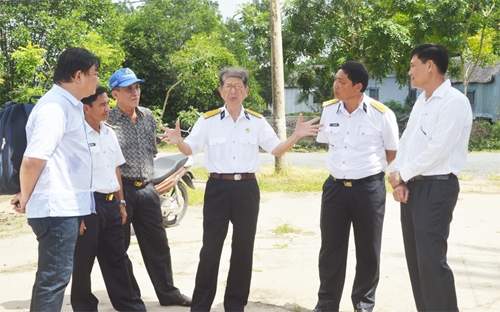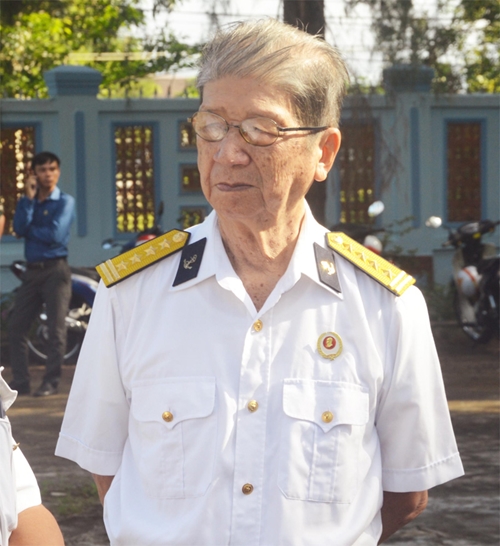Although decades have passed by, memories of the years helping no-number ships are still fresh in the mind of Senior Naval Captain Khuu Ngoc Bay, former Commanding Officer of Regiment 962 (now Brigade 962 of Military Region 9), and have inspired him to write emotional poems.
Fresh memories
According to Senior Naval Captain Khuu Ngoc Bay, Mission 962 had four ports to receive military supplies from the North, including Vam Lung in Ca Mau, A10 in Ben Tre, B22 in Tra Vinh and Ba Ria - Vung Tau. Vam Lung port in Tan An commune of Ngoc Hien district alone received 66 successful shipments. These achievements were greatly contributed by Bay and his teammates.
    |
 |
|
Senior Naval Captain Khuu Ngoc Bay (third from right) talks about no-number ships. |
The veteran recalled that he was sent to the South on a no-number ship full of military supplies to reinforce troops’ fight against the enemy in 1964 and was assigned to receiving and guiding no-number ships to avoid the enemy’s hunt. One of his most unforgettable memories was the shipment in mid-April, 1966. That time, his unit received the news from the higher level and Mission 125 (now Naval Brigade 125) that Ship 69 just left Hai Phong. The ship was scheduled to reach Bo De or Vam Dung ports in a week. On April 22, Bay and his comrades were present at the ports to wait for the ship but it did not show up. Having been reported that the ship had lost contact, Bay and his teammates thought of two possibilities. First, Ship 69 might have been discovered and attacked by the enemy. Second, it might have arrived at a wrong position. As there was no battle happening earlier, the team was absolute sure that the ship must have entered the wrong place.
Facing that situation, the unit organized many groups to go along the river banks to look for the ship, but there was no sign of it. At nightfall, a courier, named Thanh Thuong, reported that Ship 69, captained by Nguyen Huu Phuoc, was hiding in Vam Ho creek. Having heard of the news, all members of the unit rushed to scene.
According to Nam Phuoc, while dodging the enemy’s continuous patrols, the ship docked at a wrong port and had to wait for the enemy troops to go away. That time, Ship 69 successfully transported 72 tons of weapons.
After the shipment, the ship’s propeller broke. As the ship weighed tens of tons, there was no way to raise the ship for maintenance. After a while, Tu Mau, Bay’s teammate, came up with an idea to take the advantage of rising tide to fix the ship. As the tide went up, crew-members towed the ship to a creek and placed mangroves under the ship’s hull as a support. As the tide went down, revealing the propeller, a company was promptly mobilized to build a dam surrounding the ship. After a week, Ship 69 was fixed and ready to head to the sea for transporting mission.
    |
 |
|
Senior Naval Captain Khuu Ngoc Bay |
At night on January 1, 1967, determining that the enemy troops were on New Year holidays, the crew-members decided to leave Vam Lung port. However, when the ship was about 30 nautical miles from the wharf, it was discovered and besieged by the enemy. Immediately, Bay’s team decided to guide the ship back. Ten minutes later, a group of the enemy’s aircraft dropped flares and Ship 69 was surrounded by four enemy’s ships. Tu Mau ordered Bay to signal the ship to go to Vam Lung port, as it was nearer. Thanks to the timely decision, the ship arrived at the port safely. However, after the voyage, the ship was no longer in service anymore, as it was heavily damaged.
Poems as a token of gratitude to former comrades
Bay’s youth was closely associated with no-number ships. He recalled that before a ship moored, troops had to look out for enemy troops and promptly unloaded weapons. Although hiding, distributing and protecting weapons were a very difficult mission, no one gave up. To protect military supplies, many of his comrades laid down their lives at sea.
In peacetime, memories of the hard, but glorious days have inspired him to compose poems. For him, poetry works are token of gratitude to his comrades and people in Ca Mau province who gave much support to him and his comrades. Most of his poems demonstrate his passionate love for his homeland and nation, reflect the close comradeship and military-civilian solidarity, and recall the wholehearted support of local people to troops during the war.
So far, Senior Naval Captain Khuu Ngoc Bay has published four collections of poems, namely “Ngoi sao tren bien” (A star at sea), “Buoi sang cuoc doi” (A dawn of life), “Bien va nhung dong song” (Sea and rivers), and “Tho va nguoi linh” (Poetry and soldiers). The veteran’s poems maybe not new in metrics, but they are beautiful in emotion and rich in images. His work, titled “Ben cang giua rung” (A port in a forest), highlighting naval troops’ mettle, patriotic spirit and indomitability, bagged the third prize of a poetry composition contest hosted by the National Committee of the Vietnam Union of Literature and Arts Associations in 2015. The epic, which was written during 14 years right after he had completed his mission at the Ho Chi Minh Trail at Sea, also won Phan Ngoc Hien Award in the 2011-2016 period.
It can be said that until now Senior Naval Captain Khuu Ngoc Bay, member of Can Tho city’s Association of Writers, is the only writer in the Mekong Delta Region who recalls his memories of the Ho Chi Minh Trail at Sea, no-number ships, ports, former comrades by poems.
Translated by Tran Hoai